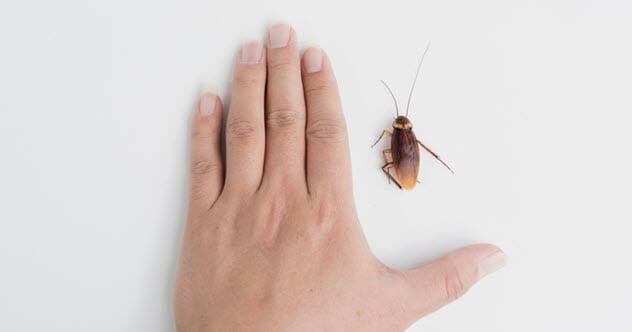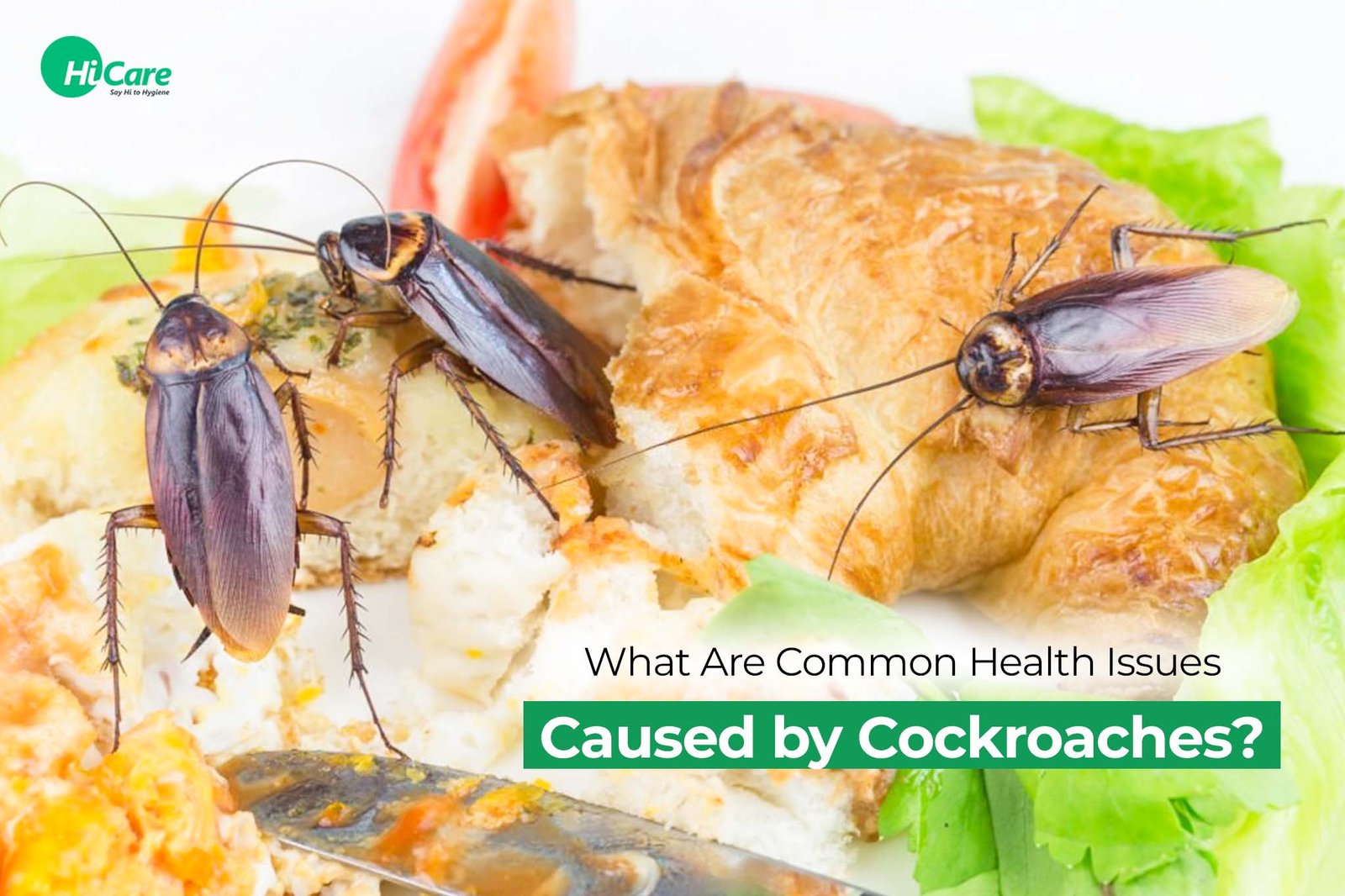When cockroaches touch humans, they can potentially transmit diseases and allergens. The risk of infection or allergic reaction is a concern with such contact.
Cockroaches are a common household pest found across the globe, often inciting a strong reaction of disgust when they come into contact with people. These resilient insects are known for their hardiness and ability to survive in various environments, from tropical climates to urban dwellings.
Their presence in human habitats is not just a nuisance but also a health concern. Cockroaches can carry numerous pathogens on their bodies and through their waste, which can transfer to humans upon contact or through contaminated surfaces. These pests are linked with asthma and allergy triggers due to the allergenic proteins found in their droppings, saliva, and decomposing bodies. While they do not bite like other pests, the health risks associated with their ability to spread bacteria and cause allergic reactions make cockroach infestations a significant issue to address promptly and effectively.
The Initial Shock
Picture this: You’re relaxing at home, and suddenly, a cockroach scampers across your hand. Your heart races; a feeling of panic sets in. That’s the initial shock of a cockroach-human encounter. But what exactly does this encounter entail for your health? Let’s delve into the details.
Pathogen Carriers On Six Legs
Cockroaches are notorious for carrying pathogens. With their tendency to crawl through unsavory places, they pick up various microbes. When they touch humans, there’s a risk of transmitting these germs. Here’s what you should know:
- Bacteria such as Salmonella and E. coli
- Fungi and viruses are potential threats
- Parasites and their eggs can hitch a ride
Thus, an encounter is not just startling but can have serious health implications.
Immediate Human Reactions
The moment a cockroach makes contact, human reactions are both physical and psychological. Skin crawling, intense scrubbing, and a mix of fear and disgust are common. Some individuals might experience:
| Reaction Type | Description |
|---|---|
| Physical |
|
| Psychological |
|
Immediate cleansing of the area is vital to reduce the risk of infection.

Credit: listverse.com
Cockroach Contact Implications
Encountering a cockroach can be more than an unpleasant surprise. These creeping critters are not just a nuisance but also a threat to human health. On skin contact, cockroaches may transmit bacteria and cause physical reactions. Let’s delve into what happens when humans and cockroaches come into contact.
Bacterial Transmission Fears
Cockroaches are known carriers of various bacteria. They crawl through decaying matter and waste, picking up harmful pathogens that may transfer to humans upon contact. Common bacterial contaminants include:
- Salmonella, which can cause food poisoning
- E. coli, leading to severe stomach cramps and diarrhea
- Staphylococcus, a source of skin infections
These bacteria can linger on your skin or transfer to surfaces you touch, increasing the risk of spreading illness.
Potential Physical Reactions
Contact with cockroaches may lead to allergic reactions or skin problems in some individuals. Physical reactions can include:
| Type of Reaction | Description | Common Occurrence |
|---|---|---|
| Rashes | Red, bumpy skin | Skin contact with cockroach allergens |
| Hives | Itchy, raised welts | Response to cockroach saliva, droppings, or molted skin |
| Asthmatic Symptoms | Difficulty breathing, coughing, wheezing | Inhalation of cockroach particles |
It’s essential to wash the affected area with soap and water to minimize these risks. Seek medical advice if you experience severe or persistent symptoms.
Allergic Responses To Roaches
Roaches are more than just unwelcome guests that scurry around our homes. They carry allergens that can cause real health concerns. When these pests touch humans, they can trigger allergic reactions for some people. Let’s explore the common allergens found in cockroaches and how to identify related rashes.
Common Allergens in Cockroach BodiesCommon Allergens In Cockroach Bodies
Cockroaches hold a range of protein-rich allergens. These substances often spread through the air in homes infested by roaches. Here are some allergens found in cockroaches:
- Fecal matter: Roach droppings.
- Saliva: Contains proteins which are allergenic.
- Exoskeletons: Breaking down into dust after they shed.
The above allergens can mix with dust in your home and become airborne, potentially worsening asthma symptoms or leading to allergies.
Identifying Cockroach-Related RashesIdentifying Cockroach-related Rashes
Touching cockroaches or coming into contact with their allergens can lead to skin rashes for some individuals. These rashes might look like:
| Symptoms | Appearance | Area of Body |
|---|---|---|
| Redness | Small bumps or hives | Often where contact occurred |
| Itchiness | Splotchy or raised areas | Could be widespread |
| Swelling | Thick areas of skin | Localized |
If you notice these signs after potential roach exposure, wash the area with soap and water immediately. For persistent or severe reactions, seek medical advice. Spotting skin changes early can help manage symptoms and prevent escalation.
Myths Vs. Facts
Welcome to the “Myths vs. Facts” segment of our exploration into what happens when cockroaches touch humans. Common misconceptions can cause unnecessary alarm, so it’s crucial to separate fact from fiction. Let’s dive into the world of cockroaches and their interactions with humans, debunking falsehoods along the way.
Cockroach Cleanliness Misconceptions
Cockroaches are notoriously linked with unclean environments, but what’s the truth? Let’s bust a few myths:
- Myth: Cockroaches are clean creatures that groom themselves.
- Fact: While they do groom, cockroaches can still carry bacteria and pathogens.
This means that even though cockroaches spend time cleaning their antennae and body, they are still potential vectors for diseases. Their grooming habits cannot undo the contaminants they pick up while rummaging through garbage and waste.
Understanding Insect-human Interaction
The thought of a cockroach crawling on human skin can make anyone squirm. Here, we differentiate between common beliefs and actual risks:
| Belief | Reality |
|---|---|
| Cockroaches bite humans often. | It is rare for cockroaches to bite humans. |
| Cockroaches touching skin causes instant illness. | Direct contact does not always lead to immediate health concerns. |
While contact with cockroaches is undeniably unpleasant, it rarely results in immediate harm. Cleanliness and prompt response, like washing the area of contact, greatly reduce potential health risks.
Infection Risks And Treatment
Encounter with cockroaches can be alarming. These pests are carriers of various bacteria and pathogens. When cockroaches touch humans, they can transmit diseases. Knowing the risks and how to treat potential infections is crucial. This post covers essential steps to minimize health hazards after coming into contact with cockroaches.
Cleaning After ContactCleaning After Contact
Immediate cleaning is vital after cockroach contact. Follow these steps for effective cleaning:
- Wash the area with soap and water.
- Use antiseptic to sanitize the site.
- Dispose of or clean contaminated clothes.
| Step | Action | Purpose |
|---|---|---|
| 1 | Wash with soap | Cleanse skin |
| 2 | Apply antiseptic | Sanitize area |
| 3 | Clean clothes | Avoid recontamination |
When To Seek Medical Help
Certain signs indicate the need for medical attention:
- Development of a rash or hives.
- Persistent itching or irritation.
- Signs of an infection like swelling.
- Allergic reactions, such as difficulty breathing.
- Monitor for symptoms.
- Visit a doctor if symptoms worsen.
- Seek emergency help for allergic reactions.
Protect yourself and stay vigilant to stay healthy.

Credit: www.reddit.com
Cockroach Avoidance Strategies
Cockroach encounters can be unsettling and create concern over the spread of disease. Understanding how to prevent interactions with these pests is paramount.
Maintaining A Clean Environment
Keeping your living space clean is a core strategy in deterring cockroaches. These critters thrive in areas with food scraps and clutter. To create an environment that repels cockroaches, follow these tips:
- Regularly sweep and vacuum to remove crumbs and debris.
- Wipe down surfaces after meal prep to clear food residues.
- Store food in airtight containers to block scents that attract cockroaches.
- Avoid leaving dishes in the sink overnight as this can be an open invitation to pests.
Cockroach Repellents And Traps
In addition to cleanliness, utilizing repellents and traps can be an effective line of defense. Below, find an array of tools to combat cockroach infestations:
| Method | Usage |
|---|---|
| Boric Acid | Apply in crevices where roaches frequent. |
| Sticky Traps | Place along baseboards and under cabinets. |
| Peppermint Oil | Use as a natural deterrent by soaking cotton balls and placing them around the home. |
A combination of traps and repellents will not only catch existing cockroaches but also prevent future unwelcome guests. Prioritize areas with high traffic and known infestation signs.
When Cockroaches Bite
While the thought of cockroaches can evoke a shiver down one’s spine, an encounter where they bite is a rare but real phenomenon. Understanding what occurs when we cross paths in the form of a bite is vital for health and peace of mind.
Frequency and Severity of BitesFrequency And Severity Of Bites
Cockroach bites aren’t a common occurrence. These insects typically scavenge for food and avoid human interaction.
Bites may happen if populations are large and food is scarce.
When cockroaches do bite, it’s usually during night hours and often gentle, inflicting small abrasions or minor wounds.
Symptoms are generally mild, including:
- Redness and swelling
- Itchiness
- Painful sensation
In rare cases, those with sensitivities may experience more severe reactions.
Treating Cockroach BitesTreating Cockroach Bites
Immediate care for cockroach bites helps prevent infection and alleviate discomfort.
- Wash the area with soap and water
- Apply antiseptic cream to avoid infection
- Use an ice pack to reduce swelling
- If itching persists, consider antihistamine cream
- Seek medical attention if you notice signs of an allergic reaction or infection
Keep your space clean and free of food debris to minimize the risk of cockroach encounters.
Addressing The Emotional Distress
Encountering a cockroach can be unsettling. These creatures often incite fear and revulsion when they scurry across our floors or, worse, our skin. While the physical contact may be harmless, the emotional impact is very real. Many people experience profound disgust and anxiety, leading to what is commonly known as ‘the willies’. This visceral reaction can stay with us long after the physical encounter has ended. Let’s explore how to handle these feelings effectively.
Combating ‘the Willies’Combating ‘the Willies’
That creepy-crawly sensation, the urge to shiver and shake—it’s known as ‘the willies’. It’s your body’s natural response to an unwanted touch, especially from pests like cockroaches. Here are some quick tips to shake off that skin-crawling feeling:
- Take a deep breath, and remember that the insect is no longer on you.
- Clean the area of skin where the cockroach touched to provide a feeling of freshness.
- Distract yourself with a different activity to refocus your mind.
- Talk to someone about your experience; sharing can reduce the distress.
Professional Help For Phobias
Sometimes, the fear cockroaches evoke is more than just a momentary reaction. For some individuals, it can develop into a phobia, known as katsaridaphobia. Professional help can make a significant difference for those struggling. Therapists use proven methods like Cognitive Behavioral Therapy (CBT) to address and manage these fears. Consider consulting a mental health professional if you:
- Feel persistent anxiety about cockroaches.
- Find your daily life impacted by this fear.
- Have trouble managing stress related to insects.
Cockroach Control And Extermination
When cockroaches come into contact with humans, they can spread bacteria and cause allergic reactions. Controlling and exterminating these pests is crucial for a clean and safe home. Let’s dive into effective solutions to keep your living spaces roach-free.
Professional Pest Control SolutionsProfessional Pest Control Solutions
Experts in pest control offer reliable methods to rid your home of cockroaches. They assess the situation, identify infestation hotspots, and apply treatments. With their knowledge, your roach problem will become a thing of the past.
- Inspection: Professionals look for signs of roaches.
- Insecticide Application: Safe and targeted sprays are used.
- Bait Stations: Bait draws roaches out and poisons them.
- Preventative Measures: Pros offer tips to keep roaches away.
Diy Methods That Work
For those preferring the do-it-yourself route, certain techniques can help manage a roach problem. Follow these steps carefully to reduce roach populations at home.
| Method | Description | Frequency |
|---|---|---|
| Boric Acid | Apply this powder in roach pathways. | Weekly |
| Essential Oils | Use peppermint or tea tree oil for natural repelling. | As needed |
| Baking Soda & Sugar | Create a mixture to bait and kill roaches. | Monthly |
| Seal Cracks | Block entry points with caulk or sealant. | As discovered |

Credit: www.facebook.com
Frequently Asked Questions
What Happens If A Cockroach Touches A Human?
If a cockroach touches a human, it may transfer bacteria or allergens but poses no immediate harm. It’s advisable to wash the area to prevent potential infections.
What To Do If A Cockroach Touches You?
Wash the contact area with soap and water immediately. Observe for any adverse reactions or irritations.
What If A Cockroach Crawls On You?
If a cockroach crawls on you, remain calm and brush it off. Then wash the area with soap and water to prevent potential bacteria spread.
Conclusion
Understanding the dynamics of human-cockroach encounters is enlightening. It’s clear that beyond the initial “ick” factor, the implications for our health cannot be ignored. Regular cleaning and proper sanitation are key to avoiding unwanted cockroach contact and the risks it carries.
Remember, these pests are carriers of microorganisms detrimental to human health. Immediate handwashing and pest control measures can safeguard your wellbeing. Stay informed and proactive in your approach to these resilient creatures.
Related posts:

I’m MD Tanvir, and I bring years of expertise gained from working closely with pest control companies to the forefront. My journey in the industry has inspired me to launch Bug Battler, a platform aimed at equipping people with the know-how to combat pests autonomously. Through Bug Battler, I aim to empower individuals with practical insights to tackle pest infestations effectively.

